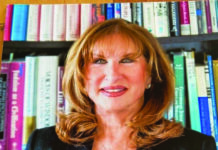
By Rabbi Shawn Zevit
Pesach
The end of Pesach often gets overlooked or becomes a countdown to the “finishing the matzah collections on the shelf.”
However, there are meaningful spiritual practices that can help bring the values and experiences of the seder into the week and weeks that follow.
The seventh night of Passover in some Jewish mystical and Chasidic circles, using the math of the ancient rabbis, became a time to re-enact the Crossing the Sea. This led to an early Chasidic custom of holding a “mirror seder” on the last day of Pesach. There was an early Chasidic custom of the rebbe giving over Pesach wisdom, of gathering around the table or in a circle and everyone rotating one chair to share their Passover wisdom from the “rebbe’s chair.”
I experienced this through Rabbi Zalman Schachter-Shalomi’s updated egalitarian practice of this ritual, and then later thanks to Philadelphia’s own Simcha Raphael and Rabbi Geela Rayzel Raphael, who developed a narrative and song-filled “Seventh Night Seder.”
As Raphael writes in the introduction to the Seventh Night Seder Haggadah: “In looking at Torah and Midrash, through the lens of mythic understanding, it is possible to discover in the ancient stories a model, a paradigm, for seeing the deeper patterns of spiritual evolution unfold in our own lives. The idea of mythic re-enactment of an ancient tale is fully consonant with what we learn at the Passover seder: hayav adam lirot et atzmo k’ilu who yatzah mi-Mitzraim — “it is incumbent upon each person to see one’s self as if they themselves had left Egypt.” This notion suggests that each time we retell the story of the Exodus, and (hence) the subsequent Crossing of the Red Sea, we are invited to find personal, contemporary spiritual connection and meaning for our own lives.”
Today, either during or around Pesach, holding an additional seder for interfaith and social justice causes has emerged with their own haggadot, such as the HIAS Immigration Seder and R. Arthur Waskow and Rabbi Phyllis Berman’s newly released “Liberating Your Seder” compendium, which includes an article I wrote on the seventh-night seder we held when the pandemic first relegated us to our own narrow places and across a digital sea of reeds.
Over the years, we have seen the emergence of feminist seders, LGBTQI seders, Jewish Labor Council seder, multifaith justice seders and many more. After the seder(s), we move into the remainder of Pesach and the weeks beyond and the opportunity to integrate and embody in our lives, the experience, meaning and values of this festival period and the exodus itself.
According to the Torah, we are directed to count the days from Passover to Shavuot. This period of 49 days is known as the Counting of the Omer. An omer is a unit of measure
for grain.
On the second day of Passover, in the days of the Temple, an omer of barley was cut down and brought to the Temple as an offering. This grain offering was referred to as the omer. Every night, from the second night of Passover to the night before Shavuot, we recite a blessing and state the count of the omer in both weeks and days.
The counting is intended to remind us of the link between Passover, which commemorates the Exodus, and Shavuot, which came to commemorate the giving of the Torah. It reminds us that the redemption from slavery was not complete until we received the Torah (a later interpretation of the meaning of Shavuot).
Over these seven weeks, daily reflection, work on one’s middot (characteristics) and potential inner and relational growth from this work on self was one way to pray for and invite the possibility of affecting one’s life and potential — nurturing and growing the fruit of our souls. These traits are not just designed to be “out there” in the esoteric world, but to be integrated and expressed in our everyday actions and relationships.
The ongoing nature of the global pandemic, the continuum of difficulty or ease in getting vaccinations, and the challenges and possibilities of our gradual and safe reopening and regathering in person in Jewish settings is shedding a light on the lessons we have learned and how we have or have not grown as human beings and as a great community in the difficult year we have been through.
The reality is we are all slaves to something — to work, or a relationship, to fear, or food, to a lack of discipline, or too much discipline, to resources and even the privileges many of us have benefited from in American society at others’ exclusion and expense. The word Mitzrayim (“Egypt” in Hebrew) means limitations and boundaries and represents all forms of constraints that inhibit our true free expression.
Our people’s redemption from Egypt teaches us how to achieve inner freedom in our lives. Enslavement is a habit that needs to be broken and transformed over an extended period.
I pray for all of us that as we conclude the week of Pesach and move toward the first fruits and revelations of Shavuot, we find the faith and courage to walk into the unknown ahead of us and work not to return to the way things were, rather forge together the “olam hesed yibaneh”— the compassionate, just and equitable world to come.
Rabbi Shawn Israel Zevit is the rabbi at Mishkan Shalom in Philadelphia, co-founder/director of the Davennen Leader’s Training Institute, associate director of the ALEPH Hashpa’ah program and co-chair of the clergy caucus of POWER Interfaith PA. The Board of Rabbis of Greater Philadelphia is proud to provide diverse perspectives on Torah commentary for the Jewish Exponent. The opinions expressed in this column are the author’s own and do not reflect the view of the Board of Rabbis.





